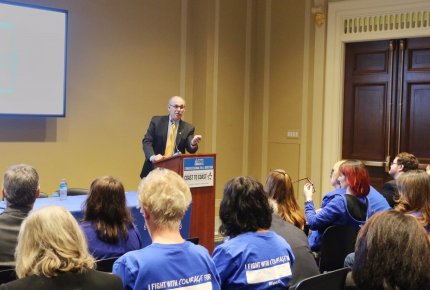“We are going to keep going and keep pushing until as few people as possible ever have to hear the words, ‘you have colorectal cancer.’”
Dr. Richard Wender, the chief cancer control officer at the American Cancer Society, made this declaration at an event held on Capitol Hill in March and hosted by ACS CAN and Fight Colorectal Cancer (Fight CRC).
Dr. Wender was joined at the briefing by other cancer experts and multiple members of Congress, who all spoke about the progress that has been made in the fight against colorectal cancer and the challenges that still exist.
This year, more than 140,000 Americans will be diagnosed with colorectal cancer and more than 50,000 people will die from the disease. However, colorectal cancer can be treated successfully if it is caught early with a routine medical exam, such as a colonoscopy procedure.

At the briefing, Dr. Wender discussed how more and more people are going to get colonoscopies. In 2014, the American Cancer Society, the CDC and other partner organizations launched the 80% by 2018 campaign with a goal to have 80% of adults age 50 or older receive regular colorectal cancer screenings by the end of 2018.
Dr. Wender said, “3.3 million additional people have been screened since we launched [this campaign]. And that was just from 2014-2016. We still have two more years of data to see how far we got.”
Currently, over 1,600 major companies and organizations, like AT&T and UPS, have signed the 80% by 2018 pledge and have committed to work towards increasing the number of their employees who receive colorectal screenings.
On Capitol Hill, a bill is currently being considered that addresses financial barriers for receiving colorectal screenings.
Rep. Charlie Dent (R-PA), Rep. Donald Payne (D-NJ) and Rep. Leonard Lance (R-NJ) spoke at the event. They are all original co-sponsors of the Removing Barriers to Colorectal Screening Act.
The bill would eliminate a loophole in the Medicare law that is leading patients to skip their regular colonoscopy due to their fear of receiving unexpected bills from their doctor.
As more people receive colorectal screenings and screening barriers, like the ones addressed in the Removing Barriers Act, are removed, fewer people will be diagnosed and die from colorectal cancer. As Dr. Wender said at the Hill briefing, “This can be done and it’s being done.”

